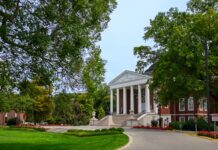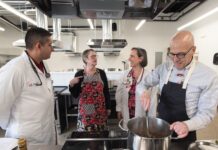
Katelyn Sheneman, a doctoral student in microbiology and immunology at UofL, is studying Yersinia pestis, the bacteria that causes bubonic and pneumonic plague, to better understand how it evades the immune system.
A native of Southern Indiana, Sheneman completed her bachelor’s degree in biochemistry at the University of Southern Indiana before coming to UofL, where she is studying with Matt Lawrenz, a professor of microbiology and immunology in the School of Medicine.
UofL News reached out to Sheneman about her own research and how UofL is helping pave the way to a future career.
UofL News: How did you first become interested in science and microbiology and immunology in particular?
Katelyn Sheneman: During my undergraduate career, I was pursuing medicine. I worked full-time at the hospital during all four years, took the MCAT, got accepted into medical school — until I finally realized I didn’t have a desire to treat illnesses, but rather to study disease prevention. The upstream progression was pretty natural from there: in order to prevent illness, you need to study preventative medicine, but in order to study/develop those therapeutics, you have to understand the disease — you have to understand the pathogen and how it is causing the disease. My interests now lie within not only microbiology but also immunology, because you cannot understand one without also studying the other.
UofL News: What has been the most exciting thing you have experienced in science so far?
Sheneman: I have been very fortunate to have many exciting experiences in science, but to answer this question, I think I would rather focus on defining experiences that validated my passion for research. During my rotation in the Lawrenz lab in my first year, my rotation involved establishing an entirely new project in the lab — we had no idea how difficult it would be or what results we would find. During my seven-week rotation, I was successful in my endeavor to establish successful protocols for this project and was fortunate enough to generate some exciting data that was included in a grant proposal Dr. Lawrenz was writing, which ultimately got funded.
This was definitely a defining moment in my scientific career.
UofL News: What are you investigating in your current research project?
Sheneman: My research is focused on the host-pathogen interactions during pneumonic plague, which is when Y. pestis infects the lungs. Specifically, I am studying the impact of Y. pestis on the production of extracellular vesicles (EVs) from neutrophils. EVs are produced by all cells in the body that facilitate communication between cells. Previous work by our lab has confirmed that Y. pestis can prevent immune cells from eliminating them. My work is focused on how Y. pestis alters the contents of the EVs and how other immune cells respond to EVs from infected neutrophil cells. Going forward, I plan to look at how the EVs produced by infected neutrophils affect the development of pneumonic plague.
UofL News: What inspired you to come to UofL and the Lawrenz lab?
Sheneman: When I was interviewing and choosing a graduate program, I was particularly interested in programs that offered biosafety level 3 lab training, which is part of the reason I was drawn to UofL. When I initially joined the program, the Lawrenz lab was not yet on my radar as I was more drawn to the biochemistry and virology labs (unsurprisingly as I joined during the pandemic). However, during orientation, the investigators who are recruiting students present their research to encourage students to rotate in their labs. During his presentation, Dr. Lawrenz showed some absolutely beautiful science, exemplifying Y. pestis as a sophisticated and “perfect” pathogen, if you will. I had never thought of infectious disease from the perspective of the pathogen, and I found this absolutely captivating. This led me to rotate in this lab where Dr. Lawrenz guided me to spearhead this new project. Our shared enthusiasm for this project is ultimately what led to me join the Lawrenz lab.

UofL News: What do you appreciate about the research community at UofL?
Sheneman: The research community is composed of individuals who are curious, driven and encouraging of students. What I appreciate most is THE encouragement to seek a diverse repertoire of mentors.
Dr. Lawrenz is an excellent principal mentor, but I have been fortunate enough to develop relationships with other mentors in other departments here at UofL as well as from other institutions across the country. These relationships allow for more well-rounded science — people from different backgrounds and expertise ask very different scientific questions. I believe these relationships have helped shape my project and steer it into new directions that I never anticipated.
What I appreciate most about the community is encouragement to seek a diverse repertoire of mentors. Dr. Lawrenz is an excellent principal mentor, but I have been fortunate enough to develop relationships with other mentors in other departments here at UofL as well as from other institutions across the country. These relationships allow for more well-rounded science — people from different backgrounds and expertise ask very different scientific questions. I believe these relationships have helped shape my project and steer it into new directions that I never anticipated.
UofL News: Recently, you received a prestigious $100,000 research award for trainees from the National Institutes of Health to help fund your research. Competition is stiff for these awards. How did you react when you learned you would receive the F31 grant?
Sheneman: I did not anticipate getting awarded an F31 on my first submission of the proposal — I was extremely surprised to say the least. I am extremely grateful and humbled, and I hope I can convey my gratitude in the productivity of my future work.
UofL News: You also work with high school students through Louisville Science Pathways. Why is this work important to you?
Sheneman: Louisville Science Pathways (LSP) is a summer program that offers high school students the opportunity to work in a research lab at UofL. The goal of the program is to bring unique opportunities in science to these students by promoting science education and literacy, as well as to introduce them to potential careers in STEM. I am currently serving in my second year as co-director of this program, but the Lawrenz lab has been actively involved in the program since before the pandemic.
I initially sought involvement in LSP because it allows me to work with students that come from a similar background as I do, having to sacrifice opportunities for career development because they depend on summer employment. LSP really provides these students with the best of both worlds: development of the skills and experience from a research internship with all of the benefits of a summer job. The most rewarding part of working with LSP is helping develop opportunities for these young scientists that I wish had been available to me when I was in their shoes, with the ultimate goal that these students will be better prepared and more competitive candidates as they pursue further education.
UofL News: What are your future plans?
Sheneman: I plan on staying in research and pursuing a post-doctoral fellowship after I complete my PhD, but after that, my path is undecided. When I started this program, I was confident that I wanted to pursue a job in government (CDC, NIH, WHO, etc.) to work at the forefront of research in infectious disease, but the prospect of staying in academia has been growing on me these past few years. At this stage in my career, I would say I am quite open-minded when it comes to my future plans.































